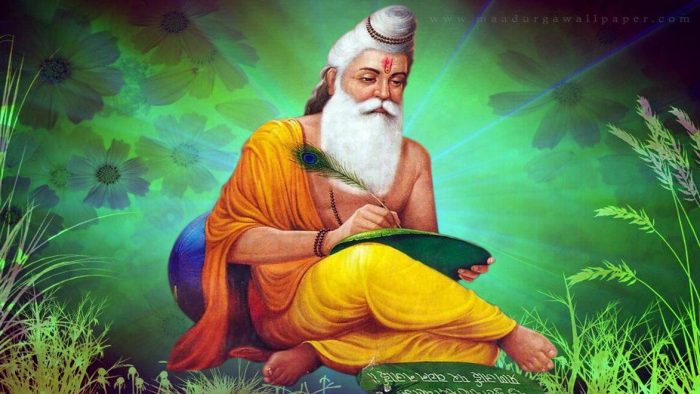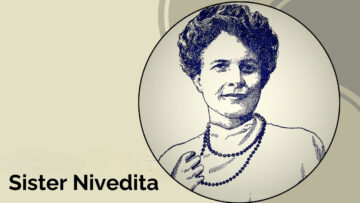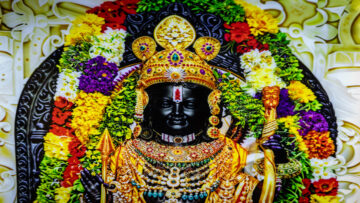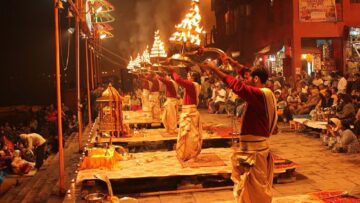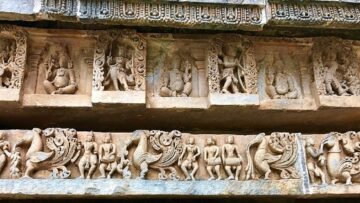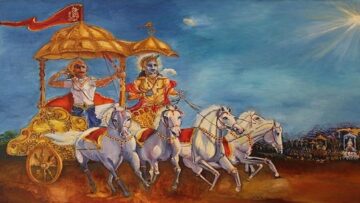The Rishis and Rishikās were great men and women in the ancient Hindu society who were able to experience Bhagavān within themselves because they followed Dharma and performed spiritual practices like meditation.
Although Rishis are found in all religions, we Hindus are really blessed to have had hundreds of them. Rishis and Rishikās lived not just in ancient times. Many of them have lived in modern times too. Let us now read incidents from the lives of some of the first Rishis and Rishikās who were the pioneers of Hindu Dharma.
Rishi Bharadvāja Realizes Knowledge is Endless
Some Rishis in the Hindu tradition are said to have lived a very long life. One of them was Rishi Bharadvāja. A beautiful story is narrated about his love for the study of the Vedas. He spent his long life of 100 years studying the Vedas.
Pleased with his love for the scriptures, Indra- the King of Devas- appeared before the Rishi and asked: “If I were to increase your life by another 100 years, what would you want to do?” Rishi Bharadvāja replied, “I would spend the next 100 years again in studying the Vedas.” Indra increased his life and returned to see the Rishi when he was 200 years old.
Indra then asked Rishi Bharadvāja, “And if I were to increase your life by another 100 years, then?” The Rishi said, “I would like to spend my next 100 years too to continue studying the Vedas.”
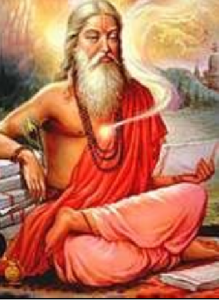
Indra then created three mountains of sand in front of the Rishi, and said, “These three mountains represent Rigveda, Yajurveda, and Samaveda. And from each mountain, your study is but a fistful of sand because endless are the Vedas (anantā vai vedāh). The more you study these scriptures, the more new things you will learn every time.”
Rishi Bharadvāja was amazed and realized that there is no end for Knowledge. Indra was pleased and said, “Well, you have studied enough. You will now reach Bhagavān very soon. ”
Today, Rishi Bharadvāja is regarded as one of the seven greatest Rishis who ever lived. Even Bhagavān Rama went to visit him at the beginning as well as at the end of his fourteen years-long exiles in the forest.
Rishi Agastya traveled far and wide to spread Dharma
Rishi Agastya was the first Rishi who traveled from northern India to South India for spreading the Sanatana Dharma.
In those days, an evil king named Rāvaṇa terrorized Rishis and other holy men in South India. He had also kidnapped Sītā, the wife of Bhagavān Rama. In fact, Rāvaṇa was none other than Agastya’s nephew, because Rāvaṇa’s father Vishravā was Agastya’s brother.
To vanquish Rāvaṇa, Agastya gave a divine weapon to Bhagavān Rama. Just before the final battle between Rama and Rāvaṇa, Rishi Agastya appeared on the battlefield and taught the stotra called ‘Aditya Hridayam’ to Rama.
Bhagavān Rama chanted the stotra thrice and was filled with the strength and energy of the sun. He was successful in defeating and killing Rāvaṇa. Everyone in south India heaved a sigh of relief at Rāvaṇa’s death.
In this example, we see how Agastya did not hesitate to kill his own nephew because he was terrorizing innocent people. This episode teaches us that we must always side with Dharma even if we have to go against our own family members.
Once, there was a drought in South India. Therefore, Agastya went to Mount Kailash in Tibet (China) and asked Bhagavān Shiva for some waters to take back. Shiva asked him to collect water from the Ganga River in a pot. When Agastya reached South India, he rested his pot on the ground. Bhagavān Ganesha took the form of a crow and toppled the pot. The water that flowed out of the pot became the River Kāverī, which has since then continued to irrigate many parts of South India for thousands of years.
Therefore, thanks to Rishi Agastya and Ganesha, South India became a very fertile region. It is said that once Bhagavān Shiva played his damaru and the sounds of Sanskrit came from its one side and those of Tamil from the other.
Rishi Agastya recorded the Tamil letters and then wrote the first book on Tamil grammar. Later, he also wrote many books on medicine (called Siddha medicine) which are used even today.
People of Indonesia believe that Rishi Agastya came to visit their country from South India, and brought the Hindu culture to them. Therefore, the Rishi was worshipped in Indonesia. Archaeologists have found mūrtīs of Rishi Agastya in old Hindu temples of Indonesia.
Rishi Bhrigu on How to Judge Greatness
One day, all the Rishis met together to decide which form of Bhagavān is the greatest. Rishi Bhrigu said, “Let me go and meet Brahmā, Vishnu and Shiva. I will test them and find out which of these three is the greatest.”
First, Bhrigu went to see Brahma who was reading scriptures. Brahma was the father of Bhrigu, but Bhrigu did not even say Namaste to his father. Brahma got very angry and said to Bhrigu, “You are a foolish man. You do not even have good manners even though you are my own son.” But Sarasvati, the wife of Brahma, asked her husband to calm down.
Then, Bhrigu went to Mountain Kailash to see Bhagavān Shiva. When Shiva saw Bhrigu arrive, He rushed to embrace Bhrigu. But Bhrigu said to Shiva, “Stop, do not hug me. You have ashes on your body and are so dirty. I do not want to embrace you.” Shiva was so annoyed that He lifted his weapon to kill Bhrigu. But Devi Parvati requested Shiva to calm down.
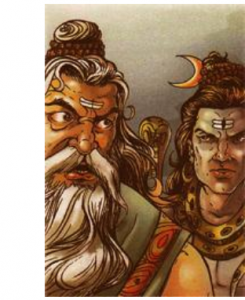 Rishi Bhrigu then went to Vaikuntha, where Bhagavān Vishnu was taking a nap. Bhrigu went close to Vishnu and suddenly kicked His chest, without any reason. Bhagavān Vishnu immediately woke up. But instead of getting angry at Bhrigu, he smiled and said, “Respected Bhrigu, I am sorry for hurting you. My chest is very strong and hard. I hope your foot did not get hurt. Let me give your foot a massage.”
Rishi Bhrigu then went to Vaikuntha, where Bhagavān Vishnu was taking a nap. Bhrigu went close to Vishnu and suddenly kicked His chest, without any reason. Bhagavān Vishnu immediately woke up. But instead of getting angry at Bhrigu, he smiled and said, “Respected Bhrigu, I am sorry for hurting you. My chest is very strong and hard. I hope your foot did not get hurt. Let me give your foot a massage.”
Rishi Bhrigu was very impressed with Bhagavān Vishnu’s behavior. He went back and told all the other Rishis that Bhagavān Vishnu is greatest because He does not get angry, and forgives even those who hurt Him.
This story does not really mean that Vishnu is superior to Shiva and Brahmā. The different Forms of Bhagavān merely enact these plays to set up a good example for people to learn and emulate them. The gist of the story is that greatness should not be measured by how much power one has or how knowledgeable one is, but by how much humility, kindness, and compassion that one possesses.
Rishi Dadhīchi Forgives Indra and helps him
Ashvinī Kumāras, the twin brothers, were unique Devatās because they had the knowledge of reviving dead people back to life. Indra thought, “My advantage over them is that I have spiritual wisdom, which they do not possess.
But if they acquire that spiritual knowledge too, then they might threaten me and become the Kings of the Devatās in my place.” Therefore out of fear and jealousy, Indra ordered that if anyone teaches spiritual wisdom to the Ashvinī Kumāras, that teacher’s head would split into a thousand pieces.
The Ashvinī Kumāras were upset when they heard of Indra’s decree. They went to a very pious Rishi Dadhīchi and requested, “O Rishi, no one dares to teach us the spiritual wisdom of the Vedic scriptures. Therefore, we are requesting you to stand up to Indra. We will replace your head with that of a horse, and when that horse head splits, we will replace it again with your original head.”
Out of kindness, Rishi Dadhīchi agreed and taught the spiritual wisdom to the twin brothers. As soon as he had done so, Indra hurled an axe and beheaded the Rishi. The Kumāras then re-grafted the head of the Rishi back to his torso when the horse head had broken into pieces. Rishi Dadhīchi regained his life and his original form.
Several years later, an evil demon named Vritra grew very powerful and he began to trouble all the residents of heaven. Finally, he even invaded heaven and drove out Indra. Homeless, Indra appealed to Bhagavān Vishnu to help him. But Vishnu replied, “Vritra can be killed only with a weapon made from the bones of a Rishi who has meditated a long time, who is pure and therefore whose bones have become charged with spiritual power. At this time, Dadhīchi is the only Rishi whose bones can give a strong enough weapon.”
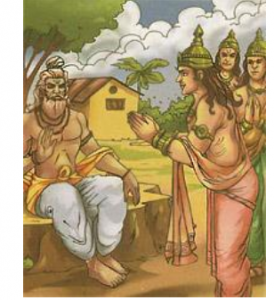
Indra became very nervous now, because he had earlier beheaded Dadhīchi. But nevertheless, he went to Rishi Dadhīchi and begged for forgiveness and told him the reason for his visit. Rishi Dadhīchi smiled and said, “Aren’t you the same person who had tried to kill me earlier? But it is the duty of Rishis to forgive and forget. And even more important, if I do not forgive you and do not give you my bones, then because of your past actions, many innocent Devatās and other creatures will suffer. Therefore, I will forgive you and permit you to take my bones.”
Rishi Dadhīchi then sat in meditation, till his soul left his body and merged with Bhagavān Vishnu. Indra then used the weapon crafted from his bones and was able to defeat Vritra in a battle. The story of Dadhīchi shows how we should forget old rivalries and enmities and should be willing to sacrifice ourselves when our society and when our loved ones are faced with a great danger.
Rishi Pippalāda realizes that a portion of the Devatās lives inside all of us
Rishi Dadhīchi gave up his body so that his bones could be used by Indra to make Vajra, a strong weapon, for killing evil Vritra. When the Rishi’s son, Pippalāda grew older, he was full of resentment for the fact that his father had to die for the sake of Indra. He blamed Indra and his Devatas for the death of his father, and all the suffering he had to undergo in his childhood due to the loss of his parent. He thought that the Devas were indeed selfish and depraved people because they asked for his father’s bones to fulfill their own selfish motives.
He decided to teach the Devatās a lesson. He meditated for long to please Shiva, Who finally appeared before him and offered him a boon. Pippalāda asked, “May the Devas burn to death!” Bhagavān Shiva asked him to choose another boon, but Rishi’s son would not agree. Therefore Shiva finally said, “So be it. Let the Devas start burning!”
But the moment Bhagavān Shiva said this, Pippalāda started feeling a strong burning sensation in his own body, from head to toe. He cried to Shiva, “What have you done Bhagavān? I had asked you to burn the Devas, but you are burning me instead!”
Bhagavān Shiva replied, “The Devas are not just outside. A portion of the Devas dwells inside all the creatures as well. Therefore, if you burn the Devas, you cannot escape their fate too. Your father was a great Rishi. No one forced him to die. All human beings have to die one day. But your father chose a very noble death, so that all the Devas and all the creatures may live. He made a great sacrifice for the sake of this Universe. Do not insult his sacrifice by bearing a grudge against the Devas.”
Pippalāda understood the greatness of his father through the words of Bhagavān Shiva, and he asked Bhagavān for forgiveness. In fact, he himself became a great Rishi and became one of the compilers of the Atharvaveda, which is one of the four divinely revealed books of the Hindus.
Rishi Āruṇī exemplifies Guru-Bhakti
Āruṇi was the son of Rishi Aruni. As per the tradition of the time, though Rishi Aruni was learned, he sent his son to study with another learned Rishi named Dhaumya. Āruṇi knew the secret of gaining the knowledge as he was the son of a Rishi. He knew that service of the Guru is the key, as it trains our minds and makes them more receptive.
His teacher gave him a job of taking care of a small farm in the outskirts of the town. The farm was on a small hill. In the rainy season, Āruṇi noticed water flowing down the hill and his crop was not getting enough water. So he told his teacher and the teacher said, “Why don’t you build a dam so that water can be saved for the farm?” Āruṇi went to build a dam.
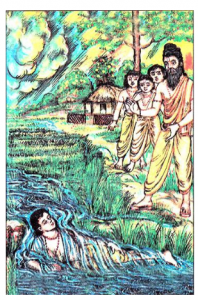
He started pouring dirt to build the dam. Regardless of how much dirt he poured, it all went with the flow of water as the water current was swift. He tried and tried, but failed. He was tired but he needed to stop the flow of water as it was the command of his teacher!
He finally got a brilliant idea. He spread himself on the ground, lying across the place where the water was flowing. He could thus stop the flow of water. It was late evening and he was thirsty and hungry. But, how could he leave? He was the dam! He decided to stay there as the dam!
His teacher noticed that Āruṇi was not back from the farm. So, he along with a few other students went to look for Āruṇi. To the teacher’s surprise, Āruṇi was lying down on the ground as the dam, to prevent water from flowing down!
Rishi Dhaumya saw Āruṇi’s faith in the teacher and his words. Dhaumya was a man of wisdom and so he told Āruṇi that water will not flow down when he got up because a dam had formed against his body as he lay on the ground for several hours. He blessed Āruṇi and told him that he would henceforth famous by the name Uddālaka. Due to his devotion to his Guru, Āruṇi became a great Rishi in his own right when he completed his education.
Rishi Mudgala: The Joy of Giving
Rishi Mudgala and his family in Kurukshetra spent most of their time in worship. He would gather excess grains scattered on the fields after the farmers had already harvested their crops, and feed his family with this meager food. Despite his poverty, Mudgala was very hospitable. No guest visiting his home left without Mudgala offering him some food.
One day, Rishi Durvāsa came to test him. He asked Mudgala for food and ate everything that Mudgala could gather that day from the fields.
This went on for several days in a row, but Rishi Mudgala did not complain even once. In fact, he would give his share of food to Rishi Durvāsa every day. On the seventh day, the latter blessed Rishi Mudgala, saying, “Despite your poverty, you did not give up your hospitality. By my Yogic powers, I will now summon Devatās to take you to heaven.” Immediately, Devatās appeared and requested Mudgala to come with them to heaven.
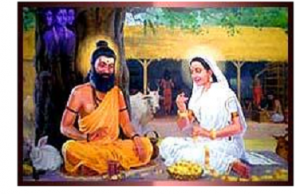
But Mudgala said that before leaving earth for heaven, he would like to know the length of his stay and the more about the pleasures of heaven. The Devatās answered, “You will stay in heaven as long as the fruit of your good karmas last. Heaven is a place full of pleasure – you will get the best food, drinks, clothes, homes, and so on. You will be very happy till you live in heaven.”
Surprisingly, Rishi Mudgala refused to accompany them to heaven saying, “What is the use of heaven if I cannot stay there forever. And I get greater joy in serving others, than in feeding myself delicious food.” Rishi Mudgala then continued on the earth, worshipping regularly and feeding every guest. When he died, his soul reached Bhagavān forever, to enjoy complete happiness for all times to come.
To be continued…
This Series was first published on India Facts.
Disclaimer: The facts and opinions expressed in this article are the personal opinions of the author. Indic Today does not assume any responsibility or liability for the accuracy, completeness, suitability, or validity of any information in this article.
Disclaimer: The opinions expressed in this article belong to the author. Indic Today is neither responsible nor liable for the accuracy, completeness, suitability, or validity of any information in the article.

